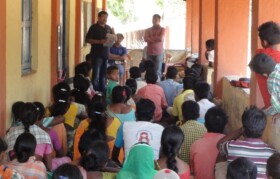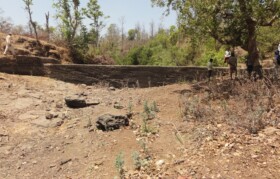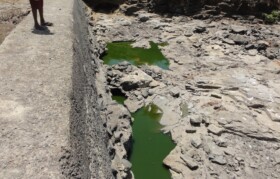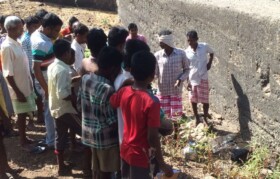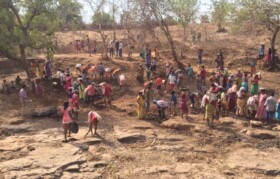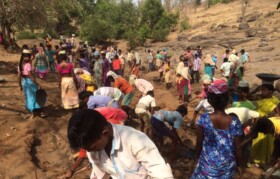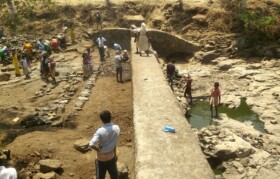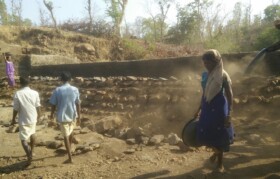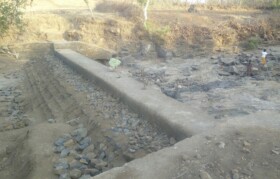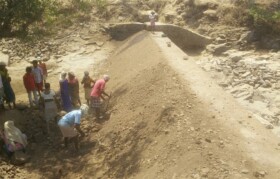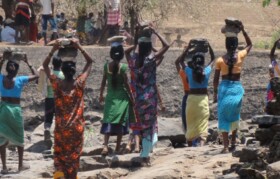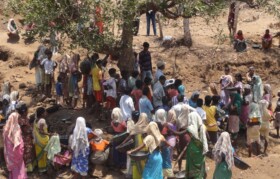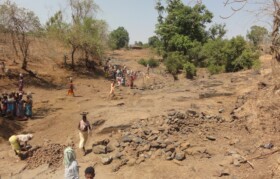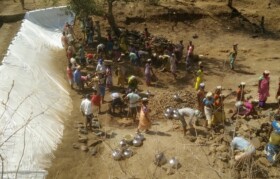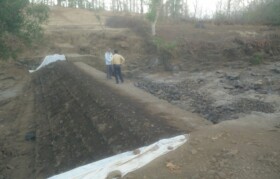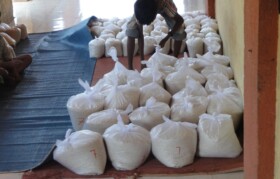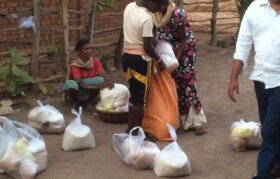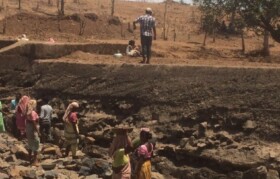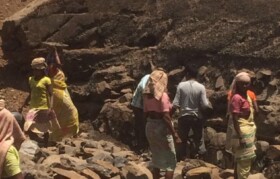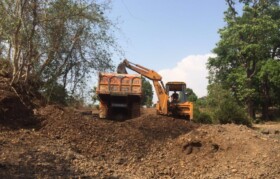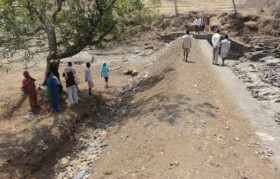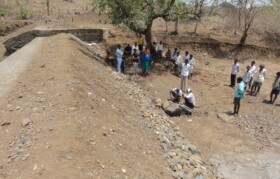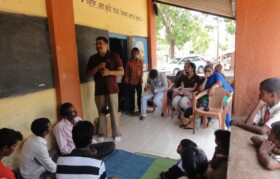Kaspada Dam – A Solution to Water Problems

This post has already been read 1498 times!
During our survey in the month of March 2016, we were convinced that if the water conservation work is not started in Vikramgad area, we may have to see Latur kind of situation in a few years from now. Though the signs were visible to the villagers as well, they were turning blind eyes towards this and getting used to the changing situation of water. The government built dams were in bad shape, there was no attempt to repair or maintain it. Hence, we decided to make the villagers realize the real problems and then make them feel the need – rather than we pushing them about the water problem. We planned visit of villagers to Dharampur (close to Vapi in Gujarat), wherein despite of moderate rains, the villagers turned the barren land into green cover by creating more than 700 check dams over a period of 27 years with the help of the NGOs. After the visit to Dharampur, we could see a completely transformed set of villagers, who accepted that the water situation in Kaspada and nearby villages was worsening in last few years especially in the months of April, May. Villager realized the criticality and also the need of having mechanism to recharge the ground water level. As per elders in the village, this has worsened in last 10 years when drinking water used to be available all round year. They requested help from Suhrid Foundation for rebuilding the check dam. Out of the existing 4 check dams, two were absolutely broken and 2 required repairing and support to make it effective. After getting the buy in, we had a detailed meeting on 10th and 23rd April 2016 at Kaspada to firm up the plan the future course action.
Action Items from 10th and 23rd April Meeting:
- Out of the four catchment areas, we identified the one which can provide maximum benefit. Approximate dimensions of the dam were planned as 10 feet high, 85 feet long and around 15 feet wide. Desilting of riverbed would be required to make size of reservoir more effective. We decided to desilt at least 400 feet to create a good reservoir.
- Villagers agreed to provide some part of their nearing land so that effective reservoir is created
- Villagers agreed to built this on “Shramdaan” basis. In this, part would be labour contribution by villagers and part would be paid by Suhrid Foundation in “food for work” mode. Villagers requested rice, wheat, pulses, oil and sugar for Suhrid Foundation’s contribution towards the labour spent by them
- Though Tuesday is day of holiday in this region, that being a good day, it was decided to do “puja” to initiate the project on 26th April 2016. Actual work to start on 27th April 2016. Representative villagers had felt that there would be at least 50-60 villagers to work on the check dam project.
Dam Project Initiation Phase
- Required equipment (spade, iron basket, stone breaking rods, etc) were purchased from Wada
- Approx effort estimation was worked out – which deviated heavily by end of the project 🙂
- Order was placed for food grains for distribution. Combination was worked out based on number of days
- Key supervisors were identified – Jitendra Patel (Mumbai) and Ajit Gonate (Kaspada teacher) were identified for day to day operations. They were to be supported by Kishore Patil (another teacher from Kaspada)
- Tentative plan when experts from Dharampur would be required was also worked out
Project Execution Phase
Experts from Dharampur were to join the team on the 3rd Day of the project. They had guided to carry out the activities related to desiliting, collecting soil and stones before that. These locals generally move out of the village during summer to work at brick kiln or construction work. They generally earn 200 to 300 Rs as per the skills. Since we had promised 100 Rs per head (which is half or even less of what they could have earned), we were expecting maximum 50 persons from the village. It was a pleasant surprise to see a turnout of 80 villagers on the first day. This surprise turned into much pleasant shock next day, when the attendance was 150. At once, we thought of requesting about 50 of them to return. However, after some deliberation, we decided to let everyone continue. This decision was taken to ensure that we maintain enthusiasm of the villagers and also help build rapport with people from other villages. The unconditional and consistent support provided by Suhrid foundation in all these years was paying rich dividend at this time.
Santu and Gangaram – the guides from Dharampur – arrived on the third day. They immediately approved the work done till the second day. Apart from creating the slanted masonry dam, they suggested to reinforce the existing concrete dam from the back. We managed to get required 85 feet long strong plastic sheet from Gujarat, which covers the entire length of the dam. This sheet was laid in the masonry dam to ensure that water does not pass through – to be further covered with another layer of soil-stone masonry.
The work continued till weekend. Sunday evening was the first day for distribution of food grains against work carried out in last 5 days. All school kids along with teachers and other Suhrid team members prepared bags with different denominations. Sunday work completed very late as team from Dharampur wanted to finish some work before they leave back. Distribution started around 6:30 for some of them who were from far-off places and not from Kaspada village. The material given to them was much more than expectation – in quantity and quality. They were overjoyed to see the material. They did not carry enough vessels to take it back. Effectively, in few cases, that ration was more than one month’s overall ration for the family (if there are more than one person from family worked). Seeing that satisfaction was the biggest highlight for us for the day – and may be even the project.
Final Punch
By the end of the first week, we had completed the major task of building the dam. We were left with desilting along the river and reinforcing the other side of the dam. . The reinforcement required 4 masons and 40 labours. Hence, we had to reduce the count. Small break was taken before starting the required desilting work. Initially done desilting of work (first 2 days) was huge in terms of labour involvement, however, the impact or end-result was not really visible. This was because, the size of the river and the quantum of work was huge. Considering the time, it was decided to complete this task with earth-movers and not manually. Even cost-wise, it would have been beneficial. Earth mover (desilting JCB) and two dumping trucks were contracted for 2 days. Even after 2 days of work, it did not appear that there was significant improvement in the size of the reservoir. We decided to continue the work for one more day. Every one day’s work carried out costs close to 16000/- After total 3 days’ of work, finally, the call was taken to call it a day. The check dam was complete. Once again, final list of grains were ordered from Mumbai. Distribution was done to villagers for remaining labour work carried in last 2 weeks.
On 14th May 2016, the project was announced to be complete. With small Puja and with group of villagers including few key people like Sarpanch and seniors from the village, the check dam was handed over to the village (Lokarpan) with vote of thanks to everyone working on the project. Everyone in team, villagers were very happy with successful completion of the work. Everyone is eager for rains now and want to see water in the big lake of this check dam.
Some statistics of the project:
| Total person days of effort spent | 860 |
| Male workers | 210 |
| Female workers | 650 |
| Total working days | 12 |
| Total cost of the project | Rs 170000 |
| Total ration distributed | Rs 90000 |
| Rice | 1660 Kg |
| Wheat | 350 Kg |
| Pulses (Turdal) | 120 Kg |
| Sugar | 300Kg |
| Oil | 435Kg |
While we would see the direct benefits once the monsoon sets in, it is quite important for us to even share the key achievements even at this juncture.
- Getting guidance and direction from Mr Rashmin Sanghvi, Santubhai, Kokilaben/Bhikhubhai Vyas from Dharampur in such a short notice was the key highlight.
- We did get constant and silent support from the villagers from Kaspada. However, getting 150 odd persons available at short notice shows the trust, which Suhrid foundation has generated.
- Villagers generally leave their families during summer to make living. Due to this assignment, we could ensure that many of these male members could stay in the village, contribute to their cause and earn at the same time.
- The experience gained by the villagers is so important. This would help us replicate the model for other dams in Kaspada and the other villages in future.
While walking around in the village we realised that wells in the villages have gone dry by now. Desilting of those wells would also be useful before rains come-in. On request of villagers, team Suhrid offered to support that as well in Shramdan model. In the week of 16th May 2016, the same would be carried out. Villagers are already happy with this work and having seen Dharampur area, want help from Suhrid Foundation for support in getting mango saplings for growing mangoes in their unused lands or border of their farms. Early July, team Suhrid would help them get it from Dharampur and Vanpath Trust team has agreed to support in this area as well.
We would like to take this opportunity to thank Rashmin bhai, team from Dharampur, Kaspada villagers. Though this project was not linked directly with the school, the teachers not only helped us getting the villagers together but also supervised the entire project. Hats off!
We have also learnt that we always treated drought as the natural phenomenon, which was wrong. The amount of rains we get is more than sufficient. We don’t use proper means to stop the water from flowing into river and mechanism to store the same for future. Furthermore, the available water is misused. Hence, we cant term drought as nature’s fury but more of our own creation.
God bless, Kaspada. Let rain God be kind this year.

